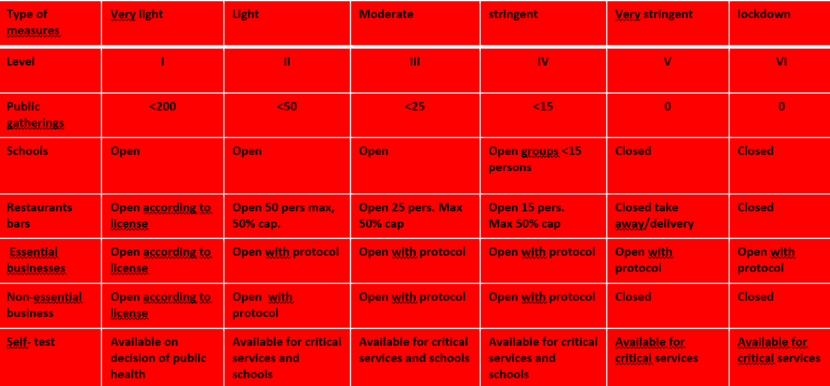Statia remains cautious while further easing the COVID-19 measures
The Public Entity St. Eustatius strongly advises Statian residents to remain cautious by taking personal responsibility (respecting hygiene guidelines, getting tested and vaccinated) while the government further eases the COVID-19 measures as of Tuesday February 1st, 2022. A maximum of 25 persons (instead of now 15) is allowed to be inside the restaurants and bars, or 50 percent of the full capacity. Dancing is still not allowed. Schools, day care centres and out of school organizations can allow 25 students per class instead of 15. The easing of measures is not yet appliable to supermarkets and non-essential businesses.
Gatherings will be once again possible as of February 1st, 2022. However, a maximum of 25 persons is allowed or 50% of the capacity of the venue. For indoor and outdoor sport activities a maximum gathering of 25 persons is also applicable. Both Government Commissioners repeat the call to the residents to get vaccinated and to get tested when not feeling well. “Considering the high number of infections, worldwide, and the contagiousness of the Omicron variant, it is impossible to get and keep Statia COVID free. Therefore, we have a shared responsibility to protect the vulnerable groups in our community. These are the elderly and persons with underlying health conditions,” says Government Commissioner Alida Francis.
The virus is spread on the island and it is expected that it will be around in the coming months. “The overall vaccination percentage of the population is still too low, 50%. The risk during an outbreak is that non-vaccinated elderly and other vulnerable groups on our island run the risk of getting infected, so they should be protected. But we must also further ease the measures as these are a burden to our economy”.
Reason
The pressure on the economy is another reason that the local government further eases the COVID-19 measures, while remaining cautious and taking steps to protect the population. This approach is aimed at keeping a balance between public health and economic development. “Additional nursing staff provided through the Ministry of Health, Welfare and Sports (VWS) are now working on the island. The capacity in the health care sector is adequate. If needed, St. Maarten can accommodate patients from Statia as the St. Maarten Medical Center (SMMC) has enough capacity. COVID-19 patients will be transferred to St. Maarten in case of deteriorating health in an early stage to assure the most optimal care. This is already the case these past weeks since the outbreak.”
Also, Alida Francis says, the number of cases is stabilizing, the infections are less severe and the symptoms are generally very mild. In addition, the number of persons needing hospital care is very low: less than 2 percent needed hospitalization up till now. The Government Commissioner further says that the population in general adheres well to the hygiene measures: wearing a face mask, keeping social distance and respecting the measures taken at public places such as restaurants, bars and supermarkets.
No changes
Non-essential businesses such as nail salons, barbershops and hair salons must adhere to the same measures. For these businesses nothing changes yet. They can only accept two customers at the time, with an appointment. These close contact professions must always wear face masks and gloves. Supermarkets and other essential businesses can only allow a maximum of 10 persons inside at the same time. Smaller shops can allow 5 persons at the same time.
Entry Policy
The entry policy will also be less strict as of February 1st, 2022. As of February 1st all countries will be considered as high risk. The requirement of a negative PCR test within 48 hours before departure to Statia will remain in effect. However, the mandatory entry test for vaccinated persons will not be applicable anymore.
All persons entering Statia from a high-risk country still must stay in quarantine (non-vaccinated persons, 7 days) or monitoring (vaccinated persons, 5 days). A mandatory anti gen test at the end of the quarantine period or monitoring period is still applicable.
Non vaccinated persons from a low-risk country must go into quarantine for 7 days with a mandatory exit antigen test on the 7th day.
Testing and vaccination
The Public Health Department will keep the intensity of testing and vaccination high. Vaccination is possible twice a week on Wednesdays and Fridays. Testing is possible daily.
After a person is tested positive, isolation of 7 days is mandatory, instead of the current 10 days. On the 7th day persons can be released after a negative antigen test. If the test is positive a re-test will be done every 3 days until there is a negative result.
If someone was in contact with a person who tested positive, quarantine of 7 days (instead of 10 days) with an antigen test on the 7th day is required. This applies to both vaccinated and non-vaccinated individuals.
The easing of the measures was decided upon after careful deliberation with stakeholders: the Ministry of Health, Welfare and Sports (VWS), Dutch Institute for Health and Environment (RIVM) the Public Health Department, the Crisis Team, the Island Council, the St. Eustatius Business Association, the tourism and hospitality sector, school principals/management and church leaders.

